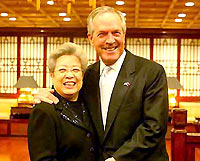
A China-US intellectual property rights (IPR) roundtable Thursday acknowledged Beijing was making progress in IPR protection, but it will still take time before fundamental changes reach all corners of the country.
At the conference, Vice-Premier Wu Yi introduced the areas where China has made headway in IPR protection over the past year.
"The whole country has been mobilized in the campaign against IPR infringement," she said.
US Secretary of Commerce Donald Evans said China had taken some steps to address IPR violations but they were still short of US expectations.
"Process is not progress. Results are progress," said the outgoing secretary.
James Zimmerman from the American Chamber of Commerce in China said they believed China has taken progressive steps to improve both its civil and criminal enforcement system.
He especially welcomed the move by the country in issuing a new judicial interpretation to improve the protection of IPR in China, which has substantially lowered the bar for imposing criminal penalties on IPR violators.
But he urged the government to consider new measures aimed at strengthening administrative enforcement.
Wu admitted, however, that China's governments, businesses and consumers have to make long-term concerted effort before IPR protection in the country can be changed thoroughly.
"I hope the US Government and enterprises can understand this, and see what China has achieved so far in IPR protection, and have faith in the future," said Wu.
She also spoke highly of the judicial interpretation announced last month. It made clear that offenders pirating more than 250,000 yuan (US$30,000) worth of copyrighted products can be jailed for up to seven years.
In drafting the interpretation, the Chinese side solicited opinions from many foreign sources, such as the European Commission and the US Information Technology Office, Wu said, adding the approach was "unprecedented."
Another big move last year was the formation by the State Council of a group to oversee IPR protection across the country, according to Wu, who is also head of the group.
Some 12 departments are involved in the group, including the Ministry of Commerce, the publication administration, the police and customs.
The group launched a year-long campaign in September to crackdown on IPR infringements nationwide.
Authorities prosecuted over 1,000 cases involving 550 million yuan (US$66.5 million) within two months of its launch. And local business administrations have dealt with more than 9,800 trademark infringement cases, and confiscated or destroyed over 10 million pirated products.
She said China moved forward in 2004 in communicating with other countries in the fight against IPR infringement.
The Ministry of Commerce and the IPR Protection Working Group have also established a regular communication mechanism with foreign IPR holders, according to Wu.
Li Shunde, professor of the IPR Center of the Chinese Academy of Social Sciences, said IPR protection will be a long-term process in China where private income is low and the public's IPR awareness is lacking.
"But obviously law enforcement is getting tougher, which will be a deterrent to piracy, meaning the situation will change gradually," said Li.
There is one big advantage in China's system, that is government departments can strike at IPR violators on their own initiative, according to Li.
"The fight against piracy could not have achieved what it has, had the government not been so aggressive," he said.
On Tuesday alone, local authorities in China destroyed 63.35 million pirated audio-visual discs seized last year in a campaign organized by the Ministry of Culture.
Premier Wen Jiabao, met with Evans Thursday, and thanked him for his efforts in promoting Sino-US trade over the past four years.
(China Daily January 14, 2005)
|

